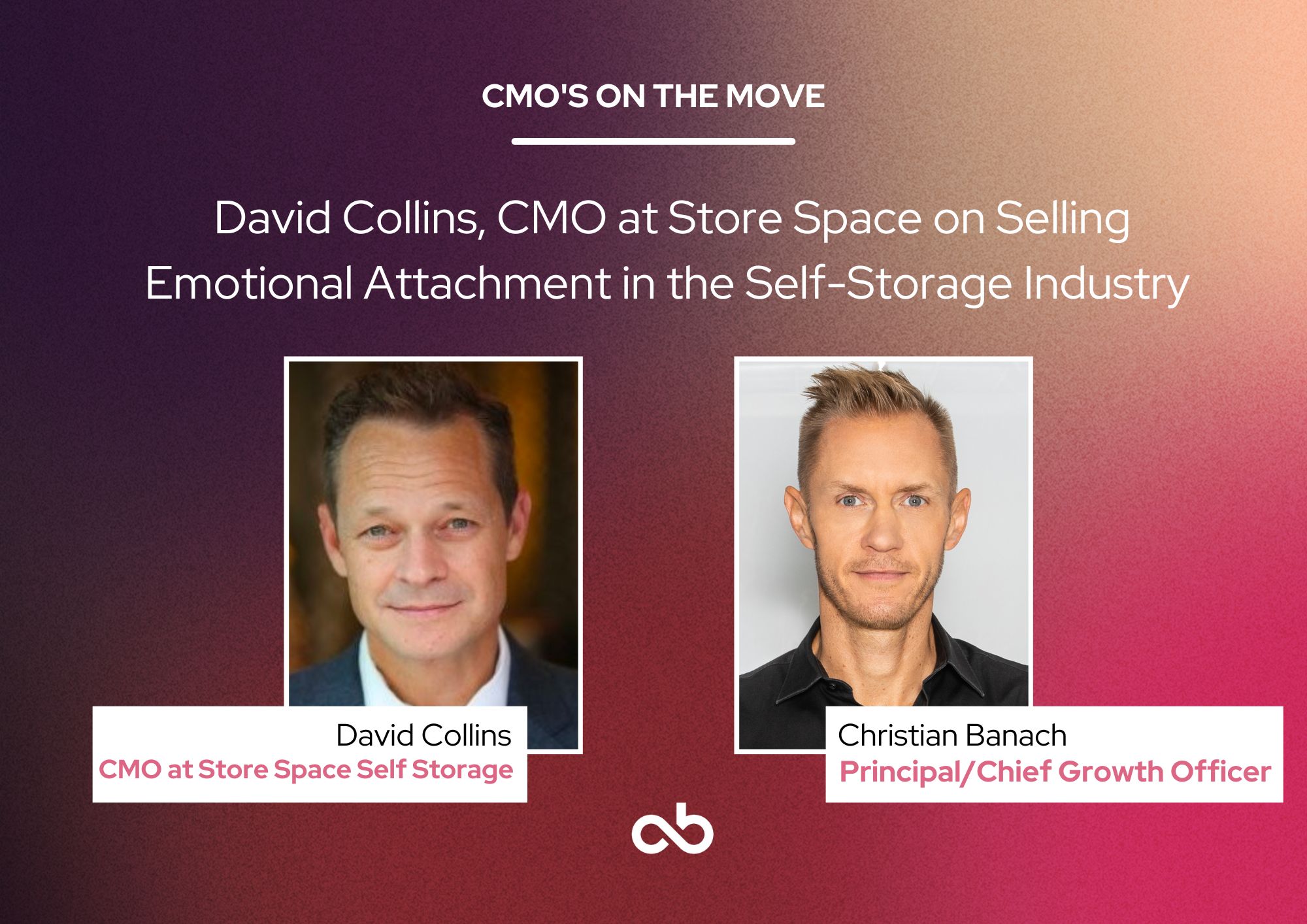/ Executive Interviews
David Collins, CMO at Store Space on Selling Emotional Attachment in the Self-Storage Industry
By: Christian Banach



The recently appointed CMO of Store Space, David Collins, is one of the pioneers in bringing the self-storage industry into the digital age. After working for iconic brands like DirecTV and Bank of America, Collins shifted into the storage industry and helped modernize its marketing practices, giving Public Storage its first mobile website, e-rental platform, and mobile app.
Christian sat down with Collins to discuss self-storage’s digital transformation, the customer service-oriented approach to leasing storage spaces, and his agency partners and collaborators.
Where to find David Collins: LinkedIn
Where to find Christian Banach: LinkedIn
Christian:
Tell us a little about your early days—your background and formative experiences that shaped you early on.
David:
I was raised on the front range of Colorado in Boulder. Skiing after school and rock climbing over my lunch hour was a fabulous opportunity as a young guy.
One of my early formative experiences came when I was an undergrad at the University of Colorado. I had the rare privilege of being a TA for an undergrad class while I was an upperclassman.
That class was called Profiles in American Enterprise, and each week a new CEO from a large corporation would come in, and then we would have a recitation session that the TAs would lead afterward.
In the 1990s, we had some spectacular CEOs come through and a lot of great opportunities to really get exposure to very high-powered and influential people in the industry.
One of the things that exposure taught me is that these were honestly just regular guys. They were obviously very bright, but they also took the time to listen.
Christian:
I understand you began your career on the agency side, working at Razorfish before you transitioned to DirecTV and Bank of America—can you tell us a little about the transition to self-storage?
David:
I finished grad school at Northwestern in 1999. And as you can imagine, the internet was hot at that point. Consulting and having any kind of knowledge base in anything digital were very much in demand. So that’s when I joined Razorfish and went into that line of work.
I worked for BofA for some time before I was actually recruited into public storage. The first couple of times Public Storage called, I didn’t return the call. I thought, like many people do, “Self-storage. Are you kidding me? You know, it’s a garage. You put stuff in it. I mean, that’s not interesting at all.”
I went over and met with the team, and I was incredibly surprised at what a brilliant group of people there were. They were very humble, very professional, but very dialed in and knew exactly what they were talking about. And that’s what drew me into the self-storage industry: the opportunity to work with a high-caliber team.
Christian:
When you started at Public Storage they were very focused on traditional advertising. From what I’ve read, at the time, only about 5% of their business was generated online.

David:
The self-storage industry in general and certainly Public Storage had a very good business model, so I approached the idea of change very carefully, as it would have sweeping implications for revenue.
What set me apart from my predecessors, brilliant people who had very traditional marketing backgrounds, was that I came out of grad school with a classically trained direct response background—everything was tracked and empirically demonstrated.
Making the case for digital transformation for me was a matter of showing the numbers—being able to track and look at “this is exactly how much we spent and how much return, here’s the rate of diminishing returns, and we can repeat this X many more times” made a big difference in earning trust.
Christian:
What have you seen as notable shifts from where the industry was 15 years ago or so?
David:
Back then, there was very much a “build it, and they will come” mentality within the industry, not specific to any one operator. And the reality is that there is certainly a perception among consumers that all self-storage is alike. It’s a commodity product.
However, there are certain operators that do a very good job with customer experience and can make a material difference in the consumer’s ultimate experience. One of the things we do here at Store Space is that we don’t have “customers,” we have “guests.”
Really, by saying guests, we want to recognize the emotional and psychological components that made them choose our location. At the end of the day, what keeps them coming back and makes them reuse your product is the fact that they had a good experience.
Christian:
You’ve recently been appointed CMO at Store Space. Tell me a little bit more about the organization itself and what your remit there is as the CMO.
David:
We are a top 20 self-storage operator with more than 100 properties in 22 states, and our growth has really been fueled by a combination of acquisitions, third-party management, joint ventures, and construction.
As CMO at Store Space Self-Storage, I’ve been tasked with accelerating performance. I’m working with the team to create very high engagement and generate the lowest cost for acquisitions with the longest length of stay.
Christian:
How do you envision standing your ground against some of the bigger players?
David:
The advantage is that our scale allows us to be very nimble and innovative. We have the flexibility that comes with not being a publicly traded entity, and our investors are in alignment with our long-term vision and goals: to reinvent the industry and the guest experience and to become the largest privately held self-storage company in the US.
Christian:
What advice would you give agencies to help navigate the self-storage business?
David:
It’s almost cliché how straightforward self-storage appears to many marketers. But I would say it would be a mistake to overlook what I consider to be the critical nuance of the industry. We’re not selling space in a box. That may be the physical execution of what our industry does, but our real product is actually a psychological one.
The tip to understanding what we really do in the industry is that we don’t rent self-storage space. Our real product and our real benefit are allowing people to hold on to their emotional attachments for the privilege of writing us a check. That’s what this industry is about, and that is the service that we provide.
Christian:
What does your in-house team look like today? Are you looking to build it out now?
David:
We have individuals dedicated to things that you would consider to be very traditional now—search engine optimization, paid digital advertising, social media—that type of thing, supported by talented graphic designers and content marketers.
I find more and more that being able to do proper data analysis and have a proper understanding of consumer behavior is critical to success. As I’ve said, we’re in an emotional business, so understanding what triggers and what behaviors correlate with various experiences can be very helpful when you’re trying to make your advertising more effective.
Christian:
Are there any things that you’ve experienced with some of your best agency partners over the years that really helped strengthen the relationship? Advice you might give to agencies listening now.
David:
I found that a lot of agencies tend to analogize the self-storage industry to something they already know rather than doing research and learning the details of self-storage itself. The self-storage industry can be very nuanced, and it’s just a few degrees different from anything else.
So, an agency that has worked in multifamily housing, for example, may have a great experiential base in that, but unless they put forth the effort to learn the subtleties of our industry, their efforts to be a good partner are going to fall short.
Christian:
Is there anything that I asked you or haven’t asked you that you wish I would have asked you today?
David:
As a marketer, I’m feeling like I’m really living the dream—CMO of a company like Store Space—I’m often asked, “What drew you to Store Space?”
I would say at the most basic level, again, it was the people. The CEO and co-founder, Chris Harris, and the other co-founder, Rob Consalvo, are two of the sharpest minds in the industry. They are very creative guys, very forward-thinking, and progressive in what they are willing to try and test. It was a good group to partner with.
Banach and Collins discussed more about Collins’ early years and his first business retrieving errant golf balls, the history of the storage industry, and the utility of secret shopping. You can see more of the interview here.
Edited for brevity.
Sign up now! Every Monday, get breaking news of recent CMO appointments, motivation to start your week positively, and innovative business development insights.